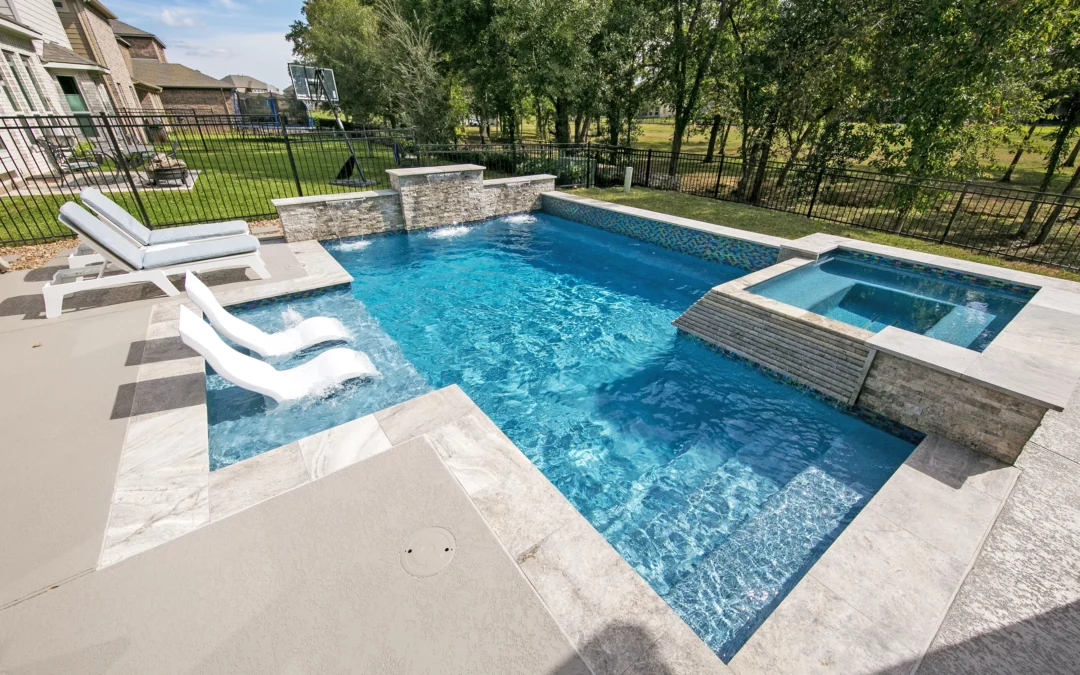When it comes to creating the perfect backyard oasis, choosing the right type of swimming pool is a crucial decision. Two popular choices stand out among the various options available: saltwater pools and traditional chlorine pools. Each option has its own pros and cons, catering to different preferences and priorities. In this article, we’ll dive into the details to help you make an informed decision based on your needs and lifestyle.
Saltwater Pools: The Pros
- Gentle on the Skin and Eyes: Saltwater pools are often praised for being gentler on the skin and eyes compared to traditional chlorine pools. The salt concentration is much lower than that of the ocean, providing a more comfortable swimming experience.
- Low Maintenance: Saltwater pools generally require less maintenance than their chlorine counterparts. The salt cell generator produces chlorine as needed, reducing the need for manual additions of chlorine. This can result in fewer trips to the pool supply store and less time spent on pool maintenance.
- Soft and Silky Water Feel: Many swimmers appreciate the soft and silky feel of saltwater. The water in a saltwater pool can be more pleasant and less harsh on the hair and swimsuits.
- Reduced Harsh Chemical Smell: Saltwater pools are associated with a milder and more pleasant odor compared to the strong chemical smell often present around traditional chlorine pools.
- Lower Operating Costs Over Time: While the initial installation cost of a saltwater system is higher, the operating costs can be lower over time due to reduced chemical usage and maintenance requirements.
Saltwater Pools: The Cons
- Higher Initial Cost: One of the main drawbacks of saltwater pools is the higher upfront cost. The initial installation of a saltwater system is more expensive than a traditional chlorine system.
- Corrosion Concerns: Saltwater can be corrosive, potentially causing damage to certain pool materials and equipment over time. It’s important to choose corrosion-resistant materials and regularly inspect and maintain the pool infrastructure.
- Electricity Consumption: Saltwater generators require electricity to convert salt into chlorine. While the amount of electricity used is relatively low, it is an ongoing cost that should be considered.
Chlorine Pools: The Pros
- Lower Initial Cost: Traditional chlorine pools are generally more budget-friendly in terms of initial installation costs, making them an attractive option for those on a tighter budget.
- Proven Effectiveness: Chlorine has been a reliable and effective pool sanitizer for decades. It is known for its ability to quickly eliminate harmful bacteria and algae, ensuring a safe swimming environment.
- Widely Available Chemicals: Chlorine-based pool chemicals are readily available at most pool supply stores, making it convenient for pool owners to maintain proper water balance.
Chlorine Pools: The Cons
- Harsher on Skin and Eyes: Chlorine pools can be harsher on the skin and eyes, especially if the chemical balance is not carefully monitored. Swimmers may experience dry skin and red, irritated eyes.
- Regular Maintenance Required: Chlorine pools typically require more hands-on maintenance. Pool owners need to regularly test and adjust chlorine levels, add stabilizers, and shock the pool to maintain water quality.
- Strong Chemical Smell: Chlorine pools are associated with a strong chemical smell, which can be off-putting for some individuals.
In the end, the choice between a saltwater and a chlorine pool depends on various factors, including budget, maintenance preferences, and the desired swimming experience. Saltwater pools offer a gentler feel and lower maintenance requirements, while chlorine pools are budget-friendly and have a proven track record of effectiveness. Consider your priorities and weigh the pros and cons to make an informed decision that aligns with your lifestyle and preferences. Whether you choose the soothing embrace of saltwater or the reliability of chlorine, a well-maintained pool is sure to provide countless hours of enjoyment for you and your family.

